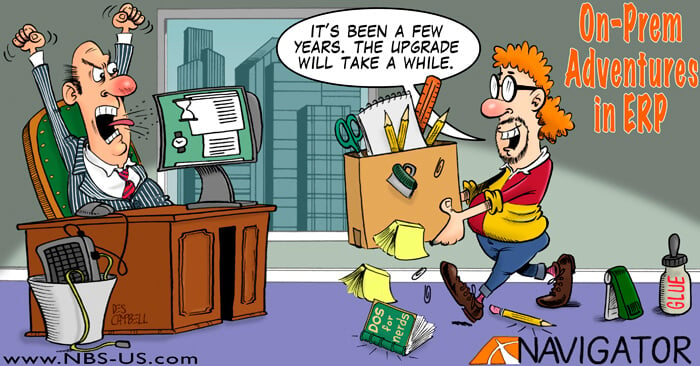
ERP Upgrade
February 05, 2021
Is it Time for an ERP Upgrade?
There is usually not a clear moment when a business knows that it needs to upgrade its ERP system. Sometimes a legacy system can no longer keep up with the needs of the business. Sometimes too much time is spent adapting the system to the changing needs of the business. Or, perhaps, the business is struggling with properly connecting its various legacy systems and things are not playing well together any longer.
The sense that it might be time for an ERP upgrade grows with time.
If you’re at the place where you’re unsure if you need an upgrade, here’s how to check.
Self-Assessment Can Offer Major Long-term Value
Best practices for evaluating the possible need for a new system include assessing the performance of business systems on a regular basis and pinpointing areas that require improvement. This will also help identify issues that could present problems down the road such as scalability and adaptability for meeting new business requirements.
The following are some of the main issues to look at when evaluating existing ERP and business process systems and solutions:
- The system isn't flexible enough to handle new requirements or otherwise limits new business initiatives.
- The solution is unable to easily support new technologies, or takes too long to incorporate new functionality. This may lead to added expenses, delays and unwanted downtime.
- System features are not user friendly nor efficient.
- The solution is slow, inadequate or cumbersome.
- High costs make it difficult to maintain and support the existing system, and the vendor offers minimal help.
If any of these issues apply to your existing ERP or other business process systems, it may be time to seriously consider upgrading or consolidating.
Planning for Integrated Cloud ERP
If ERP upgrade does seem like it might make sense, start by considering a cloud-based solution. Modern cloud ERP solutions offer a practical path for upgrading your outdated systems, and also serve to integrate a number of back-end processes. They can consolidate and replace disparate old applications and solutions that are no longer able to work together efficiently.
Modern cloud-based solutions offer an intuitive, consolidated system for managing a broad range of business processes. A cloud-based deployment means there is very little upfront cost, with the bulk of the expense spread out on a subscription basis. That makes this type of offering easy to budget for, as it will count as an operating rather than a capital expense.
Even so, there are a number of practical cost considerations to take into account when assessing a new cloud ERP solution:
- You will need networking and peripheral devices like barcode scanners, mobile devices, remote entry stations and client software. All will require support.
- Existing data will need to be converted and entered into the new system, and old records will need to be archived but accessible.
- A disaster preparation and recovery plan should be in place, including backup and failover, data recovery and redundant connectivity.
- The ERP implementation team and all future users will need education and training.
- Your business will need to create new workflow development and documentation.
- You may require assistance and support during implementation.
- Additional costs may be incurred during implementation and training for employee overtime as well as outside support while workers are trained.
Solutions such as SAP Business One and SAP Business ByDesign are available with much of that support built into the implementation costs. By working with a trusted implementation partner, you can ensure your business has ongoing technical and training support throughout the deployment process and beyond.
A modern cloud ERP solution, deployed with the help of an experienced implementation partner, will ultimately help improve your business performance. Having a single system for viewing and analyzing a variety of business data is a huge asset for long-term planning, development and strategy.
An integrated solution also can help improve customer service through more efficient and accurate ordering, fulfillment and delivery processes, along with better communications. Improved customer service will ultimately help increase sales and profits as well as market share.
This type of offering can also improve overall workplace efficiency and productivity. Streamlining data, reporting and analytics will help free up workers from a number of routine manual processes, giving them more time to focus on core business initiatives.
Cloud-based ERP solutions such as SAP's offerings are easily scalable and flexible, offering out-of-the-box integration with a host of other business process solutions and applications. They support accounting and finance, human resources, service support and CRM, sales and marketing operations and data.
On the supply chain and warehouse side, SAP Business One and SAP Business ByDesign offer easy integration with the Loxodo WMS warehouse management solution. The offering integrates all parts of warehouse management through one intuitive user interface. Data and logistics are easily integrated with other business processes through SAP, creating a truly holistic solution.
The decision to upgrade an existing ERP system or purchase a new solution to integrate disparate back-end processes is a major one. By performing regular self-assessments of current systems and processes while also understanding the benefits of an upgrade or consolidation, your business can make the right long-term decision.
To learn more about assessing your business process and ERP solution needs, read our recent blog post "Are You Needs-Blind?"

